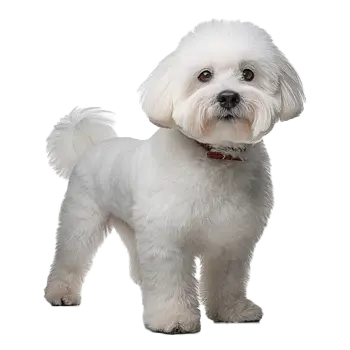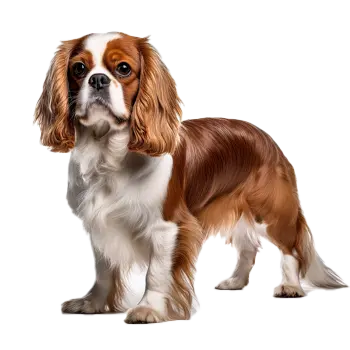Cavachon
Hybrid Breed Description
The Cavachon is a cross between the Bichon Frise and the Cavalier King Charles Spaniel. Because each hybrid inherits a unique combination of traits from both parents, we recommend thoroughly researching both breeds before choosing a Cavachon. Pay special attention to temperament, health issues, and care requirements, as your dog may express characteristics from either parent breed.
Bichon Frise

The Bichon Frise is a small, sturdy dog standing nine to twelve inches tall at the withers and weighing between ten and eighteen pounds, with individuals proportioned appropriately for their height. Despite their diminutive size, these dogs carry substantial weight and substance, presenting a compact, well-balanced appearance rather than appearing fragile or delicate. The breed features a rounded skull that may appear somewhat flat due to grooming, with a muzzle that tapers only slightly and constitutes approximately two-fifths of the head length. The nose is prominently black, and the eyes are round, dark, and expressive, creating an alert, intelligent, and gentle expression that defines the breed's appeal. Drop ears covered with long hair are set slightly below the crown of the skull and blend seamlessly into the neck. The Bichon's most distinctive feature is its remarkable powder-puff coat consisting of a soft, dense undercoat and a loosely curled or corkscrewed outer coat that stands away from the body. This double coat creates the breed's characteristic fluffy, cloud-like appearance and requires extensive grooming to maintain its shape and prevent matting. The coat is always pure white in adults, though puppies under one year may display slight beige tingeing over no more than ten percent of the body, particularly around the ears. Professional trimming every four to six weeks maintains the traditional rounded Bichon silhouette. The body is slightly longer than tall with a level topline, well-sprung ribs, and a plumed tail that arches gracefully over the back. The overall impression is one of a cheerful, animated dog with an unmistakable cotton-ball appearance that has made the breed beloved worldwide.
Key Characteristics
The Bichon Frise ranks among the most cheerful and amiable of all dog breeds, approaching each day with vivacious enthusiasm and seemingly boundless optimism. This breed demonstrates exceptional friendliness toward people of all ages, including strangers, making them outstanding companion animals but ineffective as guard dogs. Their playful, affectionate nature combined with gentle temperament ensures they typically get along beautifully with children, other household pets, and dogs of all sizes. Bichons thrive on human interaction and genuinely enjoy being the center of attention, displaying their charming personality through entertaining antics and devoted companionship. They form strong bonds with their families and strongly prefer not to be left alone for extended periods, as isolation can lead to separation anxiety or excessive barking. Intelligent and eager to please, Bichons respond well to positive reinforcement training and can excel in obedience competitions, agility trials, and learning tricks. Their cleverness allows them to master commands relatively quickly, though they possess enough independence to keep training interesting. The breed exhibits moderate to high energy levels with characteristic bursts of activity between calmer periods, requiring daily walks and interactive play sessions to maintain physical and mental health. While they make enthusiastic watchdogs who bark to announce visitors or unusual occurrences, this alertness can progress to excessive vocalization without proper training. Bichons adapt remarkably well to various living situations including apartments, provided their exercise and companionship needs are met consistently. Their combination of cheerfulness, adaptability, trainability, and affectionate devotion makes them ideal companions for families, seniors, and first-time dog owners seeking a smaller breed with a delightful personality.
The Bichon Frise is generally a healthy breed with an average lifespan of twelve to fifteen years, though they are predisposed to certain genetic health conditions that require attention and monitoring. Patellar luxation represents one of the most common orthopedic issues in the breed, occurring when the kneecap dislocates from its normal groove in the femur. Affected dogs may display a characteristic hopping gait or hold up a rear leg, with severity grading from one to four determining whether conservative management or surgical intervention is necessary. Hip dysplasia, while less common than in larger breeds, can still affect Bichons and cause arthritis or mobility problems as dogs age. Allergies occur frequently in the breed, manifesting as skin irritation, excessive scratching, ear infections, or digestive upset. Environmental allergens, food sensitivities, or contact reactions may trigger symptoms requiring veterinary diagnosis and management through diet modification, medications, or environmental changes. Dental disease poses a significant concern due to the breed's small mouth and crowded teeth, necessitating daily tooth brushing and professional cleanings beginning early in life to prevent periodontal problems, tooth loss, and systemic infections. Eye conditions including cataracts and corneal dystrophy require regular ophthalmologic monitoring. The breed's drop ears and hair growth within the ear canal predispose them to chronic ear infections if not cleaned regularly. Additional health concerns include bladder stones, particularly calcium oxalate crystals requiring dietary management or surgical removal, and liver shunts where abnormal blood vessels bypass the liver. Some Bichons develop Cushing's disease, autoimmune disorders, or diabetes mellitus. Regular veterinary examinations, preventive care including dental hygiene, maintaining healthy body weight, and attention to grooming all contribute to maximizing health and longevity in this cheerful breed.
Cavalier King Charles Spaniel

The Cavalier King Charles Spaniel is among the largest of the toy breeds, standing between twelve and thirteen inches at the withers and weighing thirteen to eighteen pounds. This breed displays a solidly built, slightly longer than tall frame with a compact body and moderately deep chest. The overall appearance combines regal sophistication with charming cuteness, presenting an elegant yet approachable demeanor. The breed features a distinctive face with large, round, dark brown eyes set well apart that contribute to its characteristic sweet and gentle expression. The skull is slightly rounded without excessive doming, and the muzzle is full and mildly tapered rather than flat. Long, feathered ears are set high and wide on the crown, fanning forward slightly to frame the face when the dog is alert. The neck is fairly long and gracefully arched, set atop well laid back shoulders. The Cavalier's silky coat is of moderate length with a slight wave permitted, though the texture should never be curly. Abundant feathering appears on the ears, chest, legs, and tail, with the long feathering on the feet being a distinctive breed characteristic. The coat comes in four recognized color patterns: Blenheim, which features rich chestnut markings on a pearly white ground; tricolor, displaying black and white with tan points over the eyes, cheeks, inside ears, legs, and underside of the tail; black and tan; and ruby, which is solid red. The Blenheim pattern often includes a valued lozenge mark or spot on the forehead. The breed's plumed tail is carried happily but never much above the level of the back, maintaining characteristic motion when the dog is active.
Key Characteristics
The Cavalier King Charles Spaniel demonstrates an enchantingly affectionate, playful, and intelligent personality, eagerly offering endearing devotion to its guardians. This breed is renowned for combining gentle attentiveness with a friendly, cheerful disposition that makes it an ideal companion dog. Shyness and aggression are notably absent from the breed's behavioral profile, replaced instead by an adaptable nature that thrives in various living situations. Cavaliers form strong attachments with their families and genuinely enjoy human interaction, making them pleasurable household companions who prefer not to be left alone for extended periods. Their desire to please combined with their social nature results in dogs that are typically friendly toward strangers and other pets, though they are not protective. The breed possesses moderate energy levels and demonstrates versatility in activity preferences. While they were bred as lap dogs and excel at providing comfort, Cavaliers retain spaniel heritage that gives them an enjoyment of moderate exercise and outdoor activities. They adapt well to both active families who engage in regular play and less active households that provide daily walks. Their intelligence and eagerness to please make them highly trainable and capable of excelling in obedience training, though positive reinforcement methods work best. The breed's playful nature persists throughout their lives, and they particularly enjoy interactive games and the opportunity to be the center of attention. Early socialization helps ensure well-rounded adults, though their naturally sociable temperament makes this process typically straightforward for owners.
The Cavalier King Charles Spaniel is unfortunately predisposed to several significant health conditions that potential owners should carefully consider. Mitral valve disease stands as the leading cause of death in the breed and is twenty times more prevalent in Cavaliers than in other breeds. This progressive heart condition affects over half of all Cavaliers by age five and nearly all by age ten. The disease involves degeneration of the mitral valve, causing blood to leak back into the left atrium and eventually leading to heart failure if untreated. Regular cardiac screening by a veterinarian beginning at age one is essential, as early detection allows for monitoring and management that can extend quality of life. Syringomyelia represents another serious neurological condition particularly affecting this breed, causing potentially severe pain due to fluid-filled cavities forming in the spinal cord near the brain. Additional health concerns include hip dysplasia, which causes improper fit of the thigh bone into the hip joint, and patellar luxation, where the kneecap dislocates from its normal position. Eye conditions such as cataracts, cherry eye, and dry eye require regular ophthalmologic examinations. The breed also shows predisposition to ear infections due to their long, heavy ears that require regular checking and cleaning. The average lifespan ranges from eleven to fifteen years. Responsible breeders screen for these conditions, and prospective owners should request health clearances for parents before acquiring a puppy. Regular veterinary care, maintaining appropriate weight, and monitoring for early signs of heart murmurs or other symptoms helps maximize the health and longevity of these beloved companions.
Important to Remember
Each hybrid dog is unique and may inherit any combination of traits from either parent breed. The information above represents the characteristics of the purebred parent breeds. Your Cavachon may favor one parent over the other or display a blend of both. We strongly encourage you to read the complete breed profiles for both the Bichon Frise and Cavalier King Charles Spaniel to fully understand the range of possible temperaments, health concerns, and care requirements.